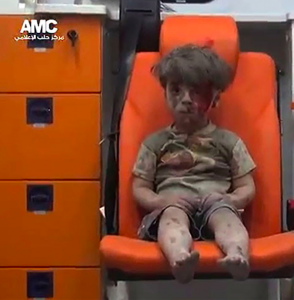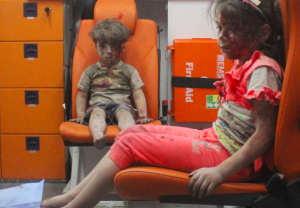There is nothing shocking about this photo. It is totally predictable for a country at war.
 Yet that is the wording chosen by the Guardian: “Shocking image emerges of Syrian child.”
Yet that is the wording chosen by the Guardian: “Shocking image emerges of Syrian child.”
And by NPR News: “A wounded child shocks the world.”
And by CBN News: “Child’s shocking image becomes the face of Syria.”
And of course by the Daily Mail: “Harrowing image shocks the world.”
Yes, the photo is distressing, but that’s not the same as shocking. ‘Shocking’ implies we should somehow be surprised. How can we be legitimately surprised? Syria is at war. This is what war looks like.
If we are genuinely shocked, either as a society or as individuals, that tells us more about ourselves than about this 5-year-old child. Being ‘shocked’ says we are living in denial. What do we think war looks like? What do we think the reported deaths of approximately 50,000 Syrian children have looked like?
The BBC News website has a page that shows those children’s names, each in turn. You need to watch for 19 hours to view the complete list.

Yes, the photo of Omran Daqneesh is distressing. His blank face forces us to look upon the psychological trauma of war. We are right to be distressed when we see such a “still, silent child”, as the NPR story put it.
The trouble for the human psyche is that distress is hard to feel. We have to do one of two things in response to it: 1) move toward it or 2) move away from it.
If truth be told, most of us choose the second option. We move away. We turn over the page. We shift our gaze. We deny. Turning away makes perfect sense when we can’t do anything useful. To look distress in the face and stand helpless is deeply painful.
That’s why our psyche needs the tools of denial and repression. They are coping mechanisms that serve a key psychological function. They save us from becoming overwhelmed. They keep us from being stopped in our tracks with sadness and horror. Denial and repression enable us to continue with our day.
However, saying we are ‘shocked’ takes us to a deeper, darker place. It implies that we are somehow surprised that a child should be traumatised by war and bombing. That is disingenuous. There is no way we can be legitimately shocked that war should bring such consequences – and we know that. In our gut, we know that.
Ultimately, then, these headlines are insulting. They make a mockery of this child’s trauma, trauma that will haunt him his whole life. The headlines encourage us to believe his distress is somehow surprising. Every news editor who opted for the headline of “shocking” should feel ashamed of their choice. It panders to sentimentality. The power editors have to help us see the world more deeply has not been exercised. I know that is entirely common for the modern day press. It still doesn’t make it okay to use a child’s pain in this way.
 The insult is made worse with statements like this one: “Warning: this article contains images that readers may find distressing.”
The insult is made worse with statements like this one: “Warning: this article contains images that readers may find distressing.”
Warning? Why do readers need a warning about looking upon distress that is predictable?
Most of the adults reading the story of this child will never have known the sound or smell or gritty residue of a bomb. They will never have known the death of their child or the terror of going to the market to be able to feed them. Most of us will never ever have to know the horror of such things. And yet we need a warning about a photo of them? Are we meant to look away if we are too upset? Five-year-old Omran Daqnessh is living inside that photo.
I acknowledge, though, that a very real problem remains. How do we look at that photo and then get on with our day, filled hopefully with absolutely important acts like getting breakfast on the table for our own children, hugging them, taking them out later to play football or for ice cream, laughing with them in the car on our way there? It is precisely that question that leads most of us to reach, unconsciously, for repression. It is a tool to help us resolve this dilemma.
Repression is normal. It is ordinary. It is understandable. Repression saves us from being overwhelmed by knowledge too painful to bear. But just because repression is normal and ordinary and understandable doesn’t make it okay. Or kind.
 What would be kinder for this traumatised lad is to sit and stare at his photo. We honour his distress when we find the courage to stop ourselves from turning over the page. We strengthen our capacity not to be overwhelmed when we practise looking distress in the face and accepting it.
What would be kinder for this traumatised lad is to sit and stare at his photo. We honour his distress when we find the courage to stop ourselves from turning over the page. We strengthen our capacity not to be overwhelmed when we practise looking distress in the face and accepting it.
Children need adults who can do that. Children need adults who are able to acknowledge their pain, to see it and sense it. Children need adults who do not rely on turning away as a coping mechanism. To feel safe, children need to know the adults around them will not desert them when they are struggling emotionally, with traumas big or small.
We may not be able to do anything at all that directly helps Omran Daqneesh, but we can use his presence on our front page to help us serve other children. Something worthwhile then comes out of the terrible, stupid tragedy that has been inflicted upon him.
There is a power that comes from the strength to stand and look distress in the face: we are impelled to action. So if you want ideas about what to do, here are some options:
- Donate money or time to a charity supporting Syria. The Guardian published a welcome article this week listing nine charities doing active work. The fabulous organisation I Am Syria lists more.
- Write to your MP and ask why the UK government has so far resettled only 1602 Syrian people out of the 20,000 planned over the next five years.
- Donate money or time to a charity in your local area that supports children traumatised by circumstances such as domestic violence, bereavement, a parent with mental illness.
- Ask yourself why the prison population is filled with adults who were once children in the care system. All people who spent time in the care system have trauma in their history – or they wouldn’t have ended up in care.
- Next time you find yourself about to speak sharply to a child (usually for some bit of behavior you didn’t like) ask yourself if there is a gentler way you could convey your thoughts – because underneath all behavior is an emotional need, and it isn’t a need to be told off.
- Hug your child, knowing that lots of parents in Syria no longer can. That includes Omran’s parents, because his older brother, Ali, was killed in the same bombing raid. That terrible fact, though, was not reported with the same breadth as his younger brother’s photo.
- Put Omran’s photo on your refrigerator, so that you can practise looking into the face of distress without denial or overwhelm. When you’ve gotten good at it, replace his photo with the face of another Syrian child. You can find a distressingly wide selection of them on the Aleppo Media Center’s Facebook page, here.
 The comments of Dr. Zaher Sahloul, a medic from Chicago who volunteers in Aleppo, received widespread coverage this week when we said that the children of Syria no longer have need of our tears. I agree. Our sympathy mocks their pain if it does not lead to action.
The comments of Dr. Zaher Sahloul, a medic from Chicago who volunteers in Aleppo, received widespread coverage this week when we said that the children of Syria no longer have need of our tears. I agree. Our sympathy mocks their pain if it does not lead to action.
Denial protects us adults, but it does absolutely nothing for children.


A pertinent article on an important subject. Absolutely right, it’s too easy for out of sight to be out of mind. The BBC page of children’s names really brings it home. The list of things we can do in response is excellent. Thank you for writing this.
Thank you Suzanne. Your words are potent and true. We must do more thinking and less acting horrified.
Excellent article, Suzanne! Each of us, no matter what we are currently doing, can do more to help. And to do so, coming out of denial makes very, very good sense. A reminder, also, of the constant needs of all children for truth, and for facing the unpleasant rather than fearing it. Thanks for the wake-up call!